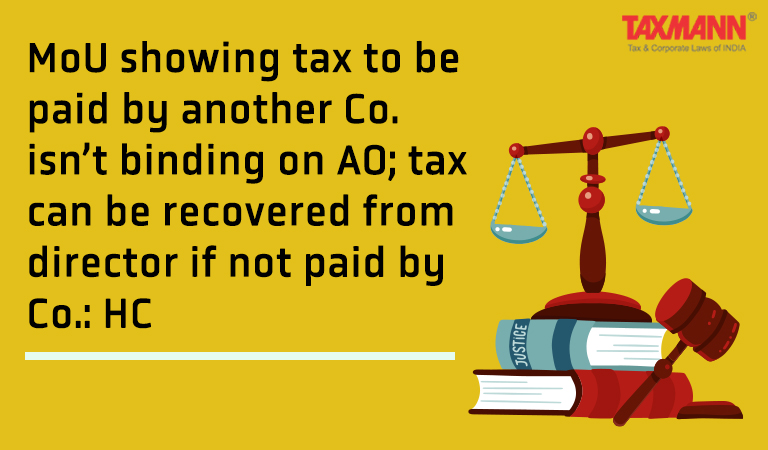MoU showing tax to be paid by another Co. isn’t binding on AO; tax can be recovered from director if not paid by Co.: HC
- Blog|News|Income Tax|
- 2 Min Read
- By Taxmann
- |
- Last Updated on 9 December, 2021

Case Details: Rajeev Behl v. PCIT - [2021] 132 taxmann.com 283 (Delhi)
Judiciary and Counsel Details
-
- Manmohan and Navin Chawla, JJ.
- Salil Aggarwal, Sr. Adv. and Madhur Aggarwal, Adv. for the Petitioner.
- Zoheb Hossain, Sr, SC, Vipul Agarwal and Parth Semwal, Jr. SC for the Respondent.
Facts of the Case
The assessee was one of the directors of a private company, namely, RGC. A memorandum of understanding (MoU) was executed according to which all the company’s income tax liability would be paid by another director of the company, namely, PD.
The Assessing Officer (AO) finalized assessment of the company and raised tax demand. However, PD failed to pay tax liability and also the company. Thus, he passed an order under section 179 against the assessee to recover the tax dues of the company. The assessee filed the writ petition before the Delhi High Court against such recovery.
High Court Held
The Delhi High Court held that section 179 imposes a vicarious responsibility on the directors for the company’s dues. However, the primary condition is that the tax dues could not be recovered from the company before section 179 could be invoked. Thus, AO has to give a finding that the tax dues could not be recovered from the company before proceeding against the director.
In the instant case, there was a specific finding that despite issuing notices and attachment orders, the entire outstanding tax dues could not be recovered from the company leaving the AO with no other option but to recover the same from the directors.
Furthermore, Section 179 only permits recovery against a director and not against other group companies which are distinct legal entities. The MOU, settlement deed, and an arbitral award govern right in personam and cannot bind a statutory authority like the respondent-revenue. It is settled law that while rights in personam are arbitrable, rights in rem are unsuited for private arbitration and can only be adjudicated by the Courts or Tribunals.
Consequently, private parties cannot apportion Income-tax liability by private agreement as the assessee had sought to do in the instant case.
Case Review
-
- Union of India v. Manik Dattatreya Lotlikar [1987] 35 Taxman 526/[1988] 172 ITR 1 (Bom.) (para 24) followed.
List of Cases Referred to
-
- Ram Prakash Singeshwar Rungtar v. ITO [2015] 59 taxmann.com 174/370 ITR 641 (Guj.) (para 11)
- Union of India v. Manik Dattatreya Lotlikar [1987] 35 Taxman 526/[1988] 172 ITR 1 (Bom.) (para 24)
- Booz Allen & Hamilton Inc. v. SBI Home Finance Ltd. [2011] 5 SCC 532 (para 25).
Disclaimer: The content/information published on the website is only for general information of the user and shall not be construed as legal advice. While the Taxmann has exercised reasonable efforts to ensure the veracity of information/content published, Taxmann shall be under no liability in any manner whatsoever for incorrect information, if any.

Taxmann Publications has a dedicated in-house Research & Editorial Team. This team consists of a team of Chartered Accountants, Company Secretaries, and Lawyers. This team works under the guidance and supervision of editor-in-chief Mr Rakesh Bhargava.
The Research and Editorial Team is responsible for developing reliable and accurate content for the readers. The team follows the six-sigma approach to achieve the benchmark of zero error in its publications and research platforms. The team ensures that the following publication guidelines are thoroughly followed while developing the content:
- The statutory material is obtained only from the authorized and reliable sources
- All the latest developments in the judicial and legislative fields are covered
- Prepare the analytical write-ups on current, controversial, and important issues to help the readers to understand the concept and its implications
- Every content published by Taxmann is complete, accurate and lucid
- All evidence-based statements are supported with proper reference to Section, Circular No., Notification No. or citations
- The golden rules of grammar, style and consistency are thoroughly followed
- Font and size that’s easy to read and remain consistent across all imprint and digital publications are applied




 CA | CS | CMA
CA | CS | CMA
